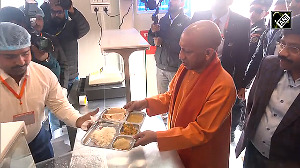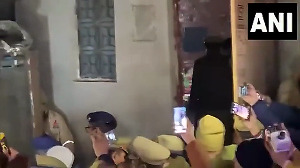Shailendra's songs were attuned to Raj Kapoor's explorations of the themes and dreams of the Everyman.
Rediff.com begins celebrations of the Great Showman's birth centenary on December 14 with this Dinesh Raheja gem.

Hindi cinema's most celebrated film-maker-lyricist jugalbandi was between a flamboyant showman, Raj Kapoor, and an introverted poet, Shailendra.
Their yin and yang balanced perfectly in classic film soundtracks throughout the 1950s and 1960s.
Several beloved, era-defining songs such as Awara Hoon, Barsaat Mein Humse Mile Tum Sajan, Ramaiya Vastavaiyya, Bol Radha Bol Sangam Hoga Ke Nahin and Pyar Hua Iqrar Hua are the result of this creative collaboration.
Kapoor's curatorial ear for music and lyrics nourished Shailendra's talents at a time when both had artistic fires in their bellies.
Shailendra's acute sensitivity and emotionalism led to writing that dazzled with lyrical lustre, and Kapoor had the ability to transform it into cinematic poetry.
Most remarkably, while their songs were immensely popular, they also had deeply felt lines that resonated.
This resulted in an unique comingling of art and popular appeal.
Songs with catchy, opening hook-lines astutely made the philosophy of subsequent stanzas more digestible.
Take for example the anthemic Mera Joota Hai Japani from Shri 420 (1955) which is much more than a song filled with nationalistic fervour.
Its verse reminds us that change is a constant...
Oopar Neeche Neeche Oopar, Lehar Chale Jeevan Ki
Nadaan Hai Jo Baith Kinare, Poochhe Raah Watan Ki
...Before denouncing stasis and exhorting propulsive movement as the only way to navigate life's peaks and valleys.
Chalna Jeevan Ki Kahani, Rukna Maut Ki Nishaani
Sar Par Lal Topi Russi, Phir Bhi Dil Hai Hindustani

Over time, the Kapoor-Shailendra team grew inextricably interlinked (though both did independent work with other creators too), so much so that in a case of cosmic irony, Shailendra passed way in 1966 on Kapoor's birthday.
Fittingly, Shailendra also embarked on his film career with Kapoor.
In the late 1940s, a 23-year-old Kapoor was making his directorial debut with Aag when he heard Shailendra, an Indian Railways employee, recite an inflammatory poem, Jalta Hai Punjab at a function, and was impressed.
In all fidelity to true art, Shailendra refused Kapoor's offer to write songs for his film.
However, when he urgently needed money after the birth of his son, Shailendra approached Kapoor who was then directing his sophomore effort, Barsaat (1949).
For a sum of Rs 500, Shailendra penned Barsaat Mein Humse Mile Tum and Patli Qamar Hai.
These warm-souled love songs written straight-from-the-heart were in simple, yet extremely effective Hindustani and went on to become Shailendra's defining characteristic.
The Barsaat numbers were superhits; and a new partnership was born.

For Kapoor's next blockbuster, Awara, Shailendra again authored the title song.
An overjoyed Kapoor started extolling Shailendra as 'Kaviraj' after he imaginatively encapsulated the lead character's dichotomous personality with just the song's opening line:
Awara Hoon
Ya Gardish Mein Hoon Aasmaan Ka Taara Hoon.
Using the cadences and idioms of contemporaneous everyday Hindi, Shailendra's songs were attuned to Kapoor's explorations of the themes and dreams of the Everyman.
In the much-vaunted Awara dream sequence Ghar aaya mera pardesi, Kapoor and Shailendra begin with the protagonist lamenting, 'Yeh nahin hai zindagi ... mujhko chahiye bahar'. Under Kapoor's direction, Shailendra's words about the common man's aspirations became a microcosm for society.
In an unprecedented turn of events, Awara proved hugely popular in Russia as well, and had two nations singing to Awara Hoon.
Shailendra was now an ineluctable part of the RK banner's music team comprising composing duo Shankar-Jaikishan and fellow lyricist Hasrat Jaipuri.
Notably, the two lyricists worked so companionably alongside each other that when Shailendra produced Teesri Kasam, he had Hasrat author the beautiful number Duniya Bananewale.

Interestingly, Shailendra was even convinced to appear on screen and lip sync his song Chali Kaun Se Desh in Kapoor's production Boot Polish (1954).
Shailendra contributed a diverse clutch of songs also to RK films that Kapoor did not direct. The Boot Polish (1954) gem Nanhe Munne Bacche is an ode to children's dignity (Bheekh Mein Jo Moti Mile Toh Bhi Hum Na Lenge).
The Jagte Raho (1956) song Jaago Mohan Pyaare is an ode to daybreak replete with delicately metaphorical lines such as Kiran Pari Gagri Chhalkaye, Jyot Ka Pyaasa Pyaas Bujhaye.
Under Kapoor's direction, Shailendra's songs could weave gossamer magic onscreen with romantic duets such as Shri 420's Pyar Hua Iqrar Hua which has the immortal line: Hum Na Rahenge Tum Na Rahoge, Phir Bhi Rahegi Nishaniyan.
In the same film, the song Dil Ka Haal Sune Dilwale cleverly reflected their creative philosophy in the line: Seedhi Si Baat Na Mirch Masala, Kehke Rahega Kehnewala.

As per the Showman's initial strategy, Shankar Jaikishan and Shailendra didn't work for films that Kapoor acted in outside his banner.
After seven years, the rule was broken with Chori Chori (1956) which yielded a rich dessert of sweet-tempered songs such as Yeh Raat Bheegi Bheegi with a high quotient of romantic enchantment.
Universal love was the dominant theme in Shailendra's songs for Anari (1959) and Jis Desh Mein Ganga Behti Hai (1960), and they played a tremendous role in articulating Kapoor's onscreen persona.
Anari's big-hearted classic Kisiki Muskurahaton Pe Ho Nisaar, Kisika Dard Mil Sake Toh Le Idhar remains a perennial favourite till date.
This team's creations had heft and attitude yet consistently avoided a platitude problem. They could present a similar worldview in a multitudinous manner, each as beautiful as the last: The Jis Desh Mein Ganga Behti Hai title song espouses: Miljul Ke Raho Aur Pyar Karo, Ik Cheez Yehi Toh Rehti Hai.
Begaani Shaadi Mein Abdullah Deewana eulogises participation in other people's happiness as Kapoor dances to Shaadi Kisiki Ho Apna Dil Gaata Hai.
The film explored dacoit reformation, and a rare sympathy and recognition of human frailty informs the song Aa Ab Laut Chale which acknowledges:
Sahej Hai Seedhi Raah Pe Chalna
Dekhke Uljhan Bachke Nikalna
Koi Yeh Chahe Maane Na Maane
Bahut Hai Mushkil Gir Ke Sambhalna

Kapoor's close association with Shailendra hit another peak with Sangam (1964), a soundtrack studded with crowd-pleasing nuggets such as Dost Dost Na Raha, Har Dil Jo Pyar Karega and O Mere Sanam.
Sangam was a smash hit, but success was not fated for Shailendra's ill-starred production of the Raj Kapoor starrer, Teesri Kasam (1966), though it was embellished with some lustrous gems like Sajan Re Jhooth Mat Bolo and Paan Khaye Saiyan Hamaro.
Shailendra had wanted to make a film of artistic merit and insisted on a sad ending, but film production was not for him.
The film dragged on for four years and Shailendra ran into financial problems.
Death had been a recurring motif in many a Shailendra soul-stirring song for Kapoor (Khud Hi Mar Mitne Ki Yeh Zid Thi Hamari).
There was always the knowledge of the transience of life (Chhotisi Yeh Zindagani Re, Kaahe Maan Kare, Abhimaan Kare, Mehman Tujhe Ek Din Toh Hai Jaana).
The poet's soul could not withstand the crash of his debut production and Shailendra passed away in 1966.
He was just 43 years old.
Kapoor cancelled all his birthday celebrations.
Though both Kapoor and Shailendra are no more, their incredible repertoire continues to resonate with audiences
Their song from Anari eloquently posits the last word on their legacy: Ke Marke Bhi Kisiko Yaad Aayenge.











 © 2025
© 2025